Wisdom teeth, also known as third molars, are the last teeth to erupt or break through the gum line and into the mouth. For most people, this usually happens between the ages of 16 and 25. But for others, they may become impacted (fail to erupt) due to lack of room in the jaw or angle of entry, and they will stay below the gum surface.
The most common type of impacted wisdom tooth is “mesial,” which means the tooth is angled forward toward the front of your mouth. There are also vertical, horizontal, and distal impactions.
Since the impacted tooth may still be under the gums and embedded in your jaw bone, your oral surgeon will need to remove a portion of the covering bone to extract the tooth. To minimize the amount of bone removed with the tooth, your wisdom tooth may be “sectioned” (cut into pieces) so each piece can be removed through a small opening in the bone.
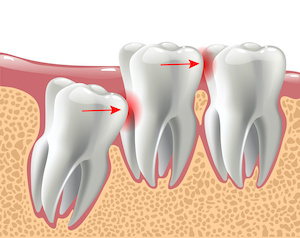
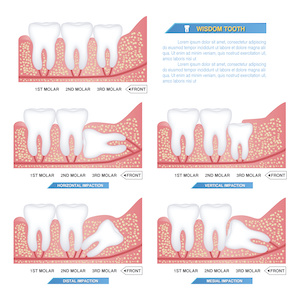
Each patient’s situation is unique. Your oral surgeon will usually take a panoramic X-ray to determine whether your wisdom teeth will need to be removed. If he or she recommends the removal of your wisdom teeth, it is best to have them removed sooner rather than later.
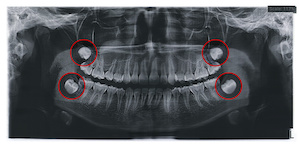
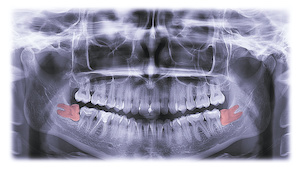
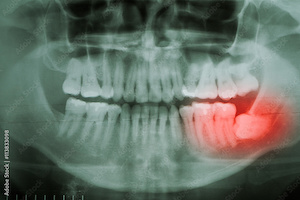
Why Should I Have Wisdom Teeth Removed?
While wisdom teeth helped our ancestors eat raw meat, we've evolved such that now they don't really serve a purpose. In fact, wisdom teeth do more harm than good if not removed. It's recommended that they are removed during the early to mid-teen years in an effort to prevent the oral health complications that are so common with untreated wisdom teeth, such as gum tenderness, swelling, or even severe pain. Impacted wisdom teeth that are partially or fully erupted tend to be quite difficult to clean and are susceptible to tooth decay, recurring infections, and even gum disease.
Complications from wisdom teeth can include:
-
Impacted Wisdom Teeth: While some wisdom teeth will break through into your mouth, impacted wisdom teeth are the ones that get stuck below the gum line and never surface in your mouth. Below the surface of your gums, impacted teeth grow at odd angles, causing complications and gum disease.
-
Wisdom Tooth Infection: When teeth only partially emerge from beneath the gums or do not fully erupt, they are challenging to keep clean. The partial opening in the gums creates enough room for bacteria to enter the tooth and the gums. When infection from the bacteria begins to formulate, many individuals experience pain, jaw stiffness, and swelling. This infection can spread to other healthy teeth and cause tooth decay.
-
Dental Crowding or Shifting: With four wisdom teeth growing in, there may not be enough room in your mouth or jawbone to hold so many teeth. Crowding or shifting the jaw bone can cause severe pain and contribute to gum disease and tooth decay.
-
Pain: When left untreated, wisdom teeth most commonly cause pain. Not only do people feel pain and soreness at the site, but also in and around the bottom jaw bone, adjacent teeth, ear, throat, or face.
These complications from untreated wisdom teeth are common and preventable if wisdom teeth are removed. Treating these complications can be expensive, painful, and even extensive in nature. Many dental health professionals agree that removing wisdom teeth early is an investment in your oral health.
When Should Wisdom Teeth Be Removed?
The American Dental Association of Oral and Maxillofacial Surgeons strongly recommends wisdom tooth removal by the time the patient is a young adult. The wisdom teeth of young adults who are in their early to mid-teen years tend to be smaller and underdeveloped. For this reason, adolescence is an ideal time for many patients to have them removed.
The underdeveloped wisdom teeth are easier to remove, and younger patients tend to heal faster and have a smoother recovery. Fewer complications tend to be experienced by younger patients, such as excessive bleeding, swelling, and discomfort.
When your child sees your dentist for regular checkups, they will monitor wisdom tooth growth through X-rays or other diagnostic scans. Once your dentist feels the time is right for wisdom teeth removal, they will refer you to a surgeon for treatment.
It is not recommended to wait until your wisdom teeth start to bother you to seek treatment and removal. Generally, it is best to remove wisdom teeth early to ensure a less complicated healing process.
Removing Wisdom Teeth for Adults
Research has found that older patients may be at greater risk for gum disease as a result of their wisdom teeth still being in place. Periodontitis in the tissues surrounding the third molars and adjacent front teeth can affect general health in addition to oral health.
While it is easier to remove undeveloped wisdom teeth during adolescence, adult wisdom teeth can still be extracted. The process and recovery time may take longer and be a little more painful since the roots of the wisdom teeth have had time to more fully develop.
However, a high-quality surgeon with years of experience in wisdom teeth removal can make the process as smooth and as comfortable as possible. At Lakeside Implant & Oral Surgery, wisdom tooth removal is commonly performed at our state-of-the-art offices.
Post Operative Care & The Healing Process
Once your wisdom teeth have been extracted, the healing process begins. Healing time varies, depending on the degree of difficulty related to the extraction. The oral surgeon will let you know what to expect and provide instructions for a comfortable and efficient healing process.
CLICK HERE FOR PRE &POST OPERATIVE INSTRUCTIONS
The Benefits of Having an Oral Surgeon Remove Wisdom Teeth
It is common for general dentists to offer wisdom teeth extraction services to their patients; however, most patients do not realize that not every dental professional is qualified to perform the procedure. There are key benefits to choosing an oral surgeon to perform your wisdom teeth extraction.
-
Surgical Training - Oral and maxillofacial surgeons are required to spend at least four years of training in a hands-on, hospital-based oral surgery residency program in addition to earning their dental degree. After having completed years of training, followed by a residency, oral surgeons learn all there is to know about both wisdom tooth extraction, teeth removal, and the entire maxillofacial area.
-
Anesthesia Training - Most people would prefer to have their extraction under general IV anesthesia versus just using local anesthesia because it is much more comfortable for patients. During the four years of hospital based oral surgery residency, oral surgeons train alongside medical anesthesiologists to safely and effectively administer anesthesia. Oral surgeons hold appropriate certifications and licenses for administration of anesthesia.
Some general dentists are able to perform extractions with proper training, but only oral surgeons are trained and qualified experts in the wisdom teeth removal procedure.

